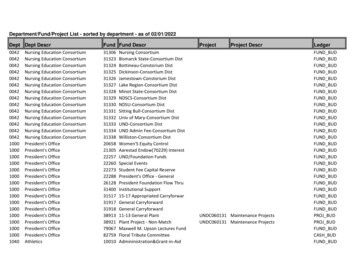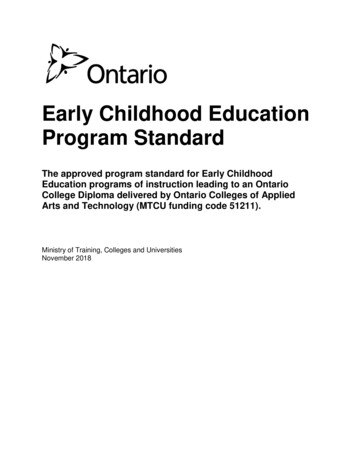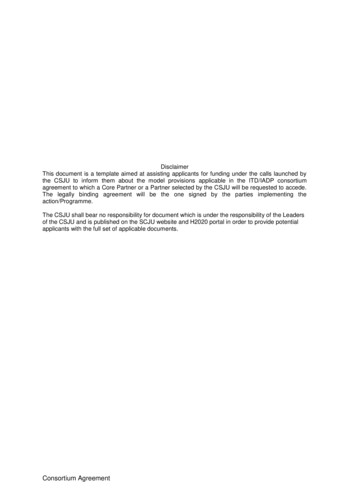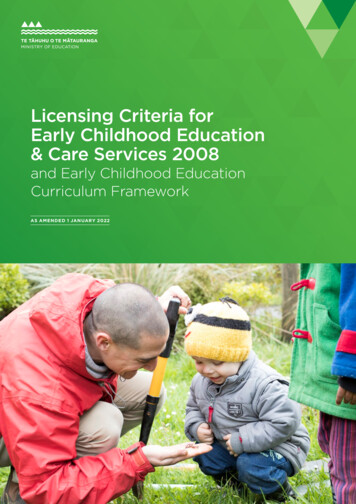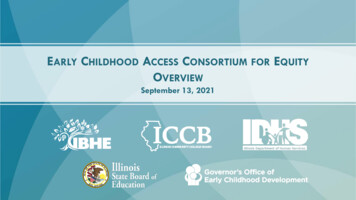
Transcription
EARLY CHILDHOOD ACCESS CONSORTIUM FOR EQUITYOVERVIEWSeptember 13, 2021
Welcome2
Today we will cover: Background and Scope of the ChallengeVision of the Early Childhood Access Consortium for EquityMembershipStructure and Function Full Transfer of AAS New ISBE Policies Student Support Services and FundingInstitutional Financial SupportsGoals and ReportingAdvisory CommitteeConsortium Kick-Off MeetingResource List3
Background: Supporting ECE Workforce Development Illinois has developed a stackable credentialing system to create careeropportunities for the early childhood care and education workforce Gateways to Opportunity Credentials are competency-based and aligned with stateand national standards 99% of Illinois institutions of higher education are entitled to offer the Gatewayscredentials An array of assessment and instructional tools, developed by faculty, are availableonline Illinois and City of Chicago policies support the acquisition of the Gatewayscredentials Higher Education Strategic Plan, A Thriving Illinois: Higher Education Paths toEquity, Sustainability, and Growth, focus on educator workforce shortage,especially early childhood educator workforce4
Early childhood workforce is in need of upskilling to meet theeducational needs of children80% Inneed ofhigherdegree70%60%50%40%30%20%10%0%Licensed CenterAdministratorHigh School Diploma/GEDBachelor's DegreeLicensed CenterTeacherLicensed CenterAssistant TeacherCommunity College CertificateGraduate DegreeFamily Child CareOwnerAssociate Degree5
Current barriers to increasing degree completions Lack of consistency when students attendmultiple institutions lead to repeat courses Incomplete articulation from 2-year to4-year programs Requirements lead students to repeat courses Confusing pathways that discourage students Courses not consistently offered, too faraway for students to access, or at timesnot workable for employed adults6
Current barriers to increasing degree completions Lack of supports for working adults to succeed in college Guidance, academicsupports, and othersupports not availableand not at times workingstudents need them Student teachingrequirements that don’tallow incumbentworkforce to stay on thejob Scholarship resources areexhausted each year,leading to interruptions instudents’ progress7
The Vision: Early Childhood Access to Equity Consortium Create a consortium to streamline, coordinate, and improve accessibility of degreecompletion pathways for incumbent early childhood workforce and employers Allow students to take coursework at multiple consortium institutions when andwhere they need it. Transfer community colleges degrees in their entirety to a participating four-yearschool so that students do not have to retake coursework or extra credit hours. Establish seamless processes for students so that they do not have to navigatemultiple institutions. Lead to sustained expansion of educational pipelines Work at regional and statewide scale Sustainable and can be expanded to other educational disciplines Embodied in P.A. 102-01748
Consortium target: 8,000 who need Bachelor’s degree and 20,000who need Gateways credentials up to an associate degreeTeachersAssistantTeachersTotalsHigh School/GED4,46311,90716,370Some college1,5705852,155CC Certificate1,5707862,356Associate Ready (Sum above categories)7,60313,27820,881Associate Degree (Bachelor's ready)5,6192,0517,670Source: Gateways Registry, Data pulled March, 20209
Membership All public universities and community colleges with early childhood programs aremembers by statute Each member of the consortium will sign-on to a set of agreements designed toensure smooth, high-quality, seamless pathways for students to their degrees. Private institutions with early childhood programs are encouraged to becomemembers of the consortium by signing-on to theset of agreements agreed to by the publicinstitutions and by meeting statutoryrequirements Only non-profit private institutions may becomemembers All members must be accredited by HigherLearning Commission and entitled to offerGateways Credentials10
Structure and Function Regional hubs with universities and associated community colleges Hub structure and operational role to be developed Course offerings within each hub available to any student enrolled in a memberinstitution if course not available at home institution Couse offering across regional hubs by agreement of membersIllinois Community College Online (ILCCO) Establish standard methods for awarding credit for prior learning Admissions, financial arrangements, registration, and advising are functions ofhome institution but honored across Consortium11
Structure and Function, continued Determine demand in partnership withemployers, including school districtsAssign college credit for incumbentworkers with Child Development Associate(CDA) credential (by 1/31/22)Leverage Gateways competencies andcompetency-based instructional modulesand assessment tools to support moreflexible and personalized paths tocompletion.If feasible: Create Open Education Resource LibrarySupport participation in statewide registry system through INCCRRA12
Full transfer of Associate of Applied Science degree Student with AAS and Gateways Level 4 and has a GPA of at least 2.0/4.0can transfer to Bachelor’s program at a university in the Consortium Member universities shall grant junior-level status in an early childhoodprogram to any student who has graduated from an Illinois CommunityCollege with an AAS in early childhood education and a Gateways Level 4credential Member universities may not require transferring student to repeat coursesapplied toward the AAS and all must count toward baccalaureate degreecompletion13
Full transfer of Associate of Applied Science degree, continued Students with AAS may not be required to take total number of credits greaterthan those of “native”students (i.e. those firststarting a baccalaureateprogram at the sameinstitution) Includes courses wherecredit was given for priorlearningAdditional coursework forendorsements to PELallowed14
ISBE Early Childhood Licensure Policies Student Teaching Pay – Student teachers may be compensated for their services per Illinois AdministrativeCode Section 25.620(f). Already in effect.Grade Range - For an early childhood education endorsement, individuals may studentteach in a setting with children from birth through grade 2. Already in effect.Supervision - Forthcoming Part 25 rulemaking will allow an educator with a level 5 gatewaycredential (rather than a PEL) to serve as cooperating teacher for candidates seeking earlychildhood licensure. Pending rulemaking. General Education Requirements Forthcoming Part 25 rulemaking will strike requirements for science and social sciencecoursework for licensure as this content is part of national standards to which programs arealigned. Pending rulemaking. Licensure Test Question by question response analysis underwayPossible actions include question removal and/or bias panel to revise questions15
Student Supports Student supports will be specifically designedfor working adults Navigators provide personalized assistance forapplication and financial aid processes. Child Care Resource &Referral agencies willoperate the navigator programISAC will provide training on financial aid tonavigators Navigators “hand-off” students to each student’sprogram coach for a personal connection. Program Coaches and/or Mentors at institutionswill provide support to students to persist andcomplete their studies. Student outreach campaign will be launched toincrease awareness16
Student Financial Supports Scholarship for Total Costs of Attendance funded through the federaldollars and with Pell and MAP to cover tuition, fees, transportation,childcare, and living expenses. Student teaching. Cost of attendance will increase to replace income lostduring a leave of absence from work, if needed. Payment of financial “holds.” Funds available to institution to helpstudents pay off outstanding balance. Currently enrolled students. Financial supports will be available tocurrently enrolled students who are members of the incumbent earlychildhood workforce.17
Scholarship OverviewEligibility Criteria: Member of the ECE incumbentworkforce pursuing a degree inECE Illinois resident who is U.S. citizenor Federal eligible noncitizen Must attend an institution memberof the Consortium Register for at least 3 credit hoursin an ECE program and be at leasta junior if enrolled at a university18
Scholarship Overview, continuedGeneral Information: Application will become available later this fall and will cover AY21-22 Program covers applicant's total cost of attendance for an academic year, plussummer, less other financial aid received, up to a maximum Students must reapply annually, and priority will be given to returning students 50 scholarships reserved for master's-level students19
Financial Supports for Institutions Curriculum design/re-design Mentors/coaches Student holds or otheremergency needs20
Goals and Reporting Goals for enrollment, persistence, and completion to be achieved bySeptember 30, 2024 Future goals to be set by agencies in consultation with Advisory Committee Recognize pipeline of associate degree completions in setting goals forBachelor’s degree enrollment and completion Regular reporting to General Assembly, Senate and House higher educationcommittees, Governor, and Advisory Committee on Consortium and individualinstitution operations21
Advisory Committee Co-Chairs: Illinois Board of Higher Education (IBHE)Illinois Community College Board (ICCB)Illinois State Board of Education (ISBE)Illinois Department of Human Services (DHS)Governor’s Office of Early Childhood Development (GOECD) Purpose: To provide guidance on the operation of the Consortium Membership: Employers and experts appointed by the Co-Chairs Includes 36 named categories of appointments, including employers, school districtsrepresentatives, early childhood advocates, leadership of the Senate Committee onHigher Education and House Committee on Higher Education, state agencies, unions,public and private colleges and universities Quarterly meetings22
Consortium Kick-Off Meeting: September 22, 2:00 – 4:00 pm Each participating institution Provost/Chief AcademicOfficer will be invited, butmay delegate a differentpermanent member23
Resources Early Childhood Access Consortium for Equity ActTHANK YOU!24
Sep 13, 2021
